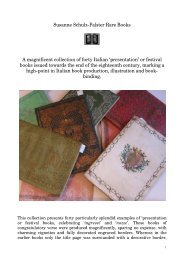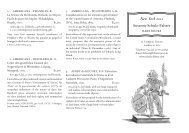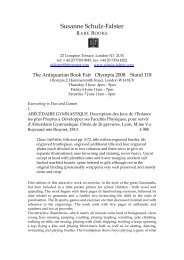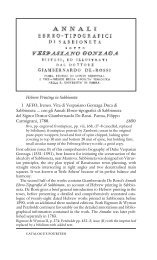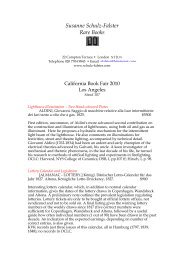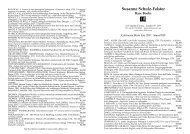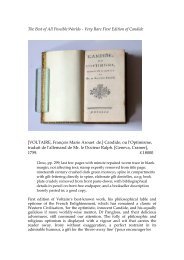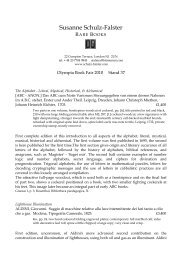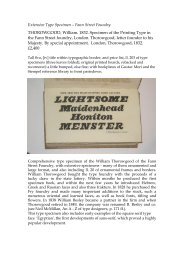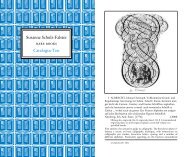Catalogue Number 7 - Susanne Schulz-Falster
Catalogue Number 7 - Susanne Schulz-Falster
Catalogue Number 7 - Susanne Schulz-Falster
You also want an ePaper? Increase the reach of your titles
YUMPU automatically turns print PDFs into web optimized ePapers that Google loves.
58 PIETROBONI, Ignazio. La Stampa. Poemetto in ottava rima<br />
diviso in tre canti all’eminentiss. E reverdiss. Principe il Sig.<br />
Cardinale Luigi Valenti Gonzaga, patricio Mantovano dedicato<br />
dall’abate Ignazio Pietroboni. Casalmaggiore, per Giuseppe Braglia<br />
Stamp. Della Città all’Insegn. Di Virgilio, 1777. £350<br />
8vo, pp. 93; typographic vignettes on title page and in the text; modern<br />
marbled boards; elegantly printed on Wrm paper; very clean and crisp<br />
with private ownership stamp to lower margin of title page.<br />
First edition and only edition, rare, of this poem in praise of printing by the<br />
Jesuit author Pietroboni. In his rambling poem Pietroboni mentions the<br />
origins of printing, talks of Gutenberg and Coester and also of SchoeVer,<br />
and reserves his particular praise for Bodoni. He particularly mentions the<br />
importance of printing technology to the spread of Christianity.<br />
Rare, NUC, RLIN and OCLC record just one copy at Columbia University;<br />
in the British Library; not in Bigmore & Wyman.<br />
A European Economic Model<br />
59 [PINTO, Isaac de.] Traité de la Circulation et du Crédit.<br />
Contenant une Analyse raisonnée des Fonds d’Angleterre, & de ce<br />
qu’on appelle Commerce ou Jeu d’Actions; un Examen critique de<br />
plusieurs Traités sur les Impôts, les Finances, l’Agriculture, la<br />
Population, le Commerce &c. précédé de l’Extrait, d’un Ouvrage<br />
intitulé Bilan général & raisonné de l’Angleterre depuis 1600<br />
jusqu’en 1761; & Suivi d’une Lettre sur la Jalousie du Commerce,<br />
où l’on prouve que l’intérêt des Puissances commerçantes ne se<br />
croise point, &c. avec un Tableau de ce qu’on appelle Commerce, ou<br />
plutôt Jeu d’Actions, en Hollande. Par l’auteur de l’Essai sur le Luxe,<br />
& de la Lettre sur le Jeu des Cartes, qu’on a ajoutés à la Wn. A<br />
Amsterdam, Chez Marc Michel Rey, 1771. £3500<br />
8vo, pp. xvi, 368, with additional [8] pages on the state of English<br />
Wnance in 1770 (interim half-sheet H* inserted between signatures Y<br />
and Z); title page a little dust-soiled, some dampstaining to gutter<br />
margin, stronger in places; uncut in the original pale blue wrappers,<br />
spine worn and slightly dog-eared; an entirely unpressed copy.<br />
First edition, rare, of Pinto’s ingenious defence of the public debt. Pinto<br />
(1715–1787), an economist and advisor to the Stathouder William IV,<br />
maintained that the public debt supported ‘circulation’ and that England’s<br />
economic advance had been promoted by her public debt and public credit.<br />
He takes Hume to task on this matter, and comments on a number of other<br />
contemporary authors, such as Berkeley, Boisguilbert, BuVon, Colbert,<br />
Diderot, Mirabeau, Petty, Rousseau and Voltaire. He is also well known<br />
for his criticism of the agricultural enthusiasm of Boisguilbert, as expressed<br />
in his Le Detail de la France and the physiocrats.<br />
susanne schulz-falster rare books catalogue seven<br />
Some attention is given to the question of population growth. Pinto<br />
points out the importance of a balanced increase of population in the cities<br />
and the countryside, in order to avoid social and economic disequilibrium.<br />
‘Pinto’s Traité is written from a national as well as an international perspective.<br />
His experience as a merchant and Wnancier in the Republic, along<br />
with his knowledge of French and English economic thought, laid the<br />
foundations for his European economic model. Pinto wanted above all to<br />
convince his readers of the soundness of the British system of public debt.<br />
With the adoption of improvements in the redemption policy proposed in<br />
his book, the system would achieve a high degree of perfection. In France<br />
the physiocratic opinions of the elder Mirabeau in particular required Pinto<br />
to respond, and in England the otherwise admiring Hume was in disagreement.<br />
By means of a critical discussion of the work of these and other authors,<br />
Pinto propagated a Wnancial policy that he thought would beneWt<br />
both the State and the individual’ (Nijenhuis).<br />
This copy contains the sheet H*, entitled L’Etat des Finances en Angleterre<br />
à la Wn de la session du Parlement en 1770, which is not always present and<br />
not mentioned by Einaudi. It does not contain the Addition au Traité (pp.<br />
369–384) and the errata leaf, which were later inserted in some copies.<br />
Einaudi 4447; Goldsmiths’–Kress 10791; Higgs 5282; INED 3603; Stourm, p.<br />
42; Szajkowski, Franco-Judaica, 868; for an elaborate analysis of Pinto’s work see<br />
I. J. A. Nijenhuis, Een Joodse Philosophe. Isaac de Pinto (1717–1787), Amsterdam,<br />
NEHA, 1992.



